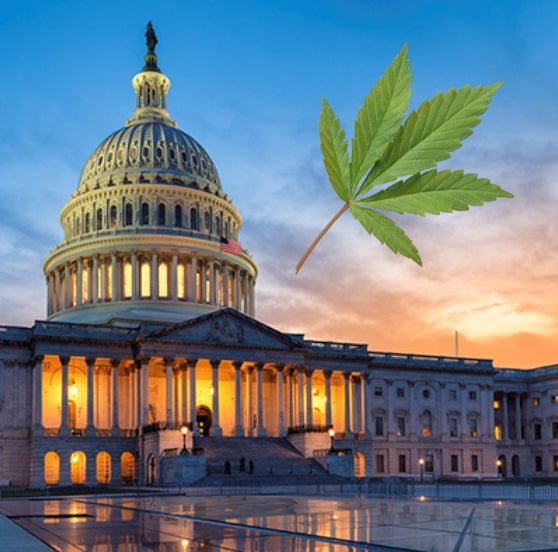If the proposed addendum survives the committee hearing process and somehow makes it to both chamber floors for a vote, it could spell disaster for the hemp industry.

The divisive and damaging civil war between hemp industry interests and those supported by the Big Cannabis lobby could be coming to a head. Since the passage of the 2018 Farm Bill, which legalized hemp and all of its downstream products and uses, both sides have battled over the contentious and controversial issue of intoxicating hemp derivates or IHDs.
While the initial purpose of changing hemp's legal status was to promote the cultivation and sale of industrial hemp for items like animal feed, eco-friendly construction materials, hemp-based bioplastics, super-absorbent alternatives for diapers and feminine hygiene products, and a host of other applications, the hemp-derived products stirring up most of the bad blood between the sister plant industries are those containing the much-maligned and mischaracterized IHDs.
Last year, both sides of the conflict had hoped Congress' planned renewal of the five-year agricultural spending behemoth would definitively decide the question of what to do with IHDs. However, bipartisan bickering and a general level of legislative ineptitude forced lawmakers to extend the 2018 version in hopes of passing a new spending bill this year.
Over the past few weeks, both parties have begun laying the groundwork for the newest iteration of the $1.5 trillion spending package that funds SNAP (food stamps) and other agricultural programs. Initially, both sides of the aisle proposed legislative frameworks that barely mentioned hemp or IHDs.
According to multiple media sources, that lack of inclusion could change dramatically if one lawmaker's proposed amendment becomes part of the bill's final version. Pennsylvania Republican Rep. Glenn "GT" Thomas, the Agriculture Committee Chairman, offered up a preliminary draft of the Farm Bill last week, including a proposal to redefine "hemp" under federal law to include hemp grown for cannabinoid extraction.
However, on Wednesday, U.S. Rep. Mary Miller (R-IL) filed a proposed amendment that would federally ban products containing detectable amounts of THC along with any cannabinoid "synthesized or manufactured outside of the plant."
Miller's amendment would also redefine hemp under federal law as any cannabis plant with 0.3% or less delta-9 THC, including tetrahydrocannabinol acid, or THC-A, the biosynthetic precursor to THC that becomes intoxicating THC when heated.
"I am offering an amendment to close the loophole that legalized intoxicating hemp products like 'Delta-8,' which is being marketed to teenagers and children. These drug-infused products are often sold in colorful packaging next to candy and snacks, which parents strongly oppose," Miller said in a message posted to the social media site X.
"I am offering an ammendment to close the loophole that legalized intoxicating hemp products like 'Delta-8,' which is being marketed to teenagers and children. These drug-infused products are often sold in colorful packaging next to candy and snacks, which parents strongly oppose."
- U.S. Rep. Mary Miller (R-IL)
The stakes in the hemp vs. cannabis melee could not be higher for both sides. Rep. Thomas' status quo approach would be the best-case scenario for proponents of the hemp market sector, which generated over $28 billion in 2023. Conversely, the deep-pocketed backers of the Big Cannabis lobby would love nothing more than to have Rep. Miller's industry-killing amendment included in the final version of the bill.
With the proposed amendment scheduled for a markup hearing in the House Committee on Agriculture on Thursday, influential voices from both sides of the heated struggle made statements leading up to the highly-anticipated debate.
In a statement about the proposed Farm Bill amendment, U.S. Hemp Roundtable General Counsel Jonathan Miller urged its defeat by House lawmakers, saying, "By federally banning all ingestible hemp products with any quantifiable level of THC, the Mary Miller Amendment would result in federal prohibition of 90-95% of all hemp products on the market, even a large majority of popular, non-intoxicating CBD products that naturally contain trace, non-intoxicating amounts of THC in them."
"By federally banning all ingestible hemp products with any quantifiable level of THC, the Mary Miller Amendment would result in federal prohibition of 90-95% of all hemp products on the market, even a large majority of popular, non-intoxicating CBD products that naturally contain trace, non-intoxicating amounts of THC in them."
- U.S. Hemp Roundtable General Counsel Jonathan Miller
He continued his attack on the intractable Miller Amendment by pointing out the catastrophic economic impact the proposed ban could have on the agricultural sector, as well as the retail side of the hemp-derived product industry.
"The redefinition of hemp to include a calculation of THC-A would wreak havoc in the fiber and grain markets … killing tens of thousands of agriculture and retail jobs, and denying access to popular products that Americans count on for their health and wellness," Miller said.
Not surprisingly, leaders within the Big Cannabis lobby voiced their wholehearted support for the amendment's exclusion of IHDs from the federal definition of legal hemp. U.S. Cannabis Council (USCC) spokesperson Josh Glasstetter believes banning IHDs from the Farm Bill's protection would allow lawmakers to regulate them much like cannabis products at the state level.
"Closing the perceived loophole in the Farm Bill would create parity and facilitate state-level regulation, followed by eventual federal legalization of all THC products," the USCC statement reads in part.
"Closing the perceived loophole in the Farm Bill would create parity and facilitate state-level regulation, followed by eventual federal legalization of all THC products."
- U.S. Cannabis Council (USCC) Spokesperson Josh Glasstetter
However, the U.S. Senate, which has yet to release the full text of its proposed version of the spending measure, could silence all of this bluster and posture from the hemp and cannabis camps. Likewise, with each party controlling one chamber by a small margin, it remains to be seen if they can pass any Farm Bill legislation during this highly emotional and critical election year.
"This Farm Bill is on life support as it is. There are the Democrats opposed on the House side, and there's a good chunk of the Freedom Caucus that doesn't like it either. It's going to be a tall order to get a Farm Bill passed this year," the Hemp Roundtable's Miller noted Wednesday before the Miller amendment.
"This Farm Bill is on life support as it is. There are the Democrats opposed on the House side, and there's a good chunk of the Freedom Caucus that doesn't like it either. It's going to be a tall order to get a Farm Bill passed this year."
- U.S. Hemp Roundtable General Counsel Jonathan Miller
A tall order indeed, Mr. Miller. A tall order indeed.







































